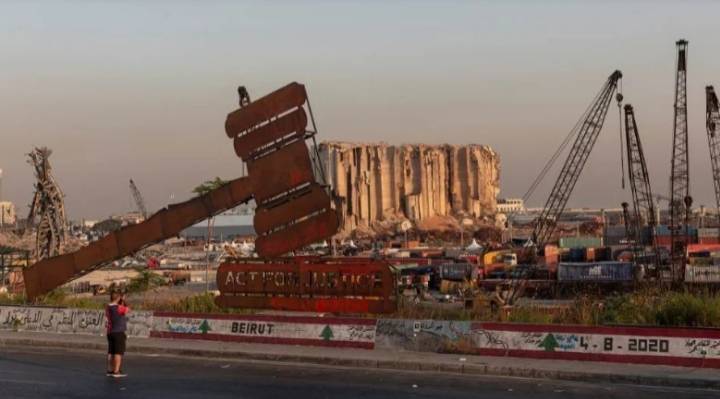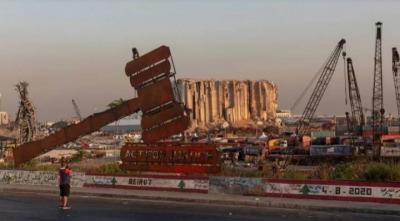Lebanon has reached the brink of explosion. There are many potential bombs that could go off. It's no longer just the financial bomb or the bomb of European judicial investigations. All institutions are living through conflicts and fractures. From the political struggle in the parliamentary council over the presidential elections, to the conflict among blocs over capital control, and the struggle that erupted over the assessment of the investigator Tarek Biatar’s actions, which was reflected in the session of the joint parliamentary committees. This leads to an open judicial conflict, manifested in Biatar resuming his work against the reactions and counterclaims made by the public prosecutor Ghassan Oueidat. Alongside them, the conflict continues between the Central Bank of Lebanon and banks, as well as between this system and the state. Additionally, there is a struggle between the army commander and the minister of defense regarding decisions affecting the military institution.
In the context of international dynamics, all these indicators suggest that we are heading toward dangerous days. Their danger lies in the chaos they will establish within the Lebanese arena; however, this may later accelerate the search for a settlement. With the ongoing open judicial conflict and anticipation of its implications, the French ambassador in Beirut has been continuing her visits to political officials. She visited the head of the Lebanese Forces party, Samir Geagea, and the head of the Free Patriotic Movement, Gibran Bassil. According to information, her visits aim to exert more pressure to achieve the election of a president for the republic.
Amidst these movements, Biatar’s action coincided with European judicial intervention in financial investigations and French and British investigations related to the port explosion, alongside American support for Biatar's movements, as reflected in the statement issued by the US embassy and spokesperson Ned Price, who confirmed: "We have made clear in the international community since the explosion that we support and urge the Lebanese authorities to complete a swift and transparent investigation into the horrific Beirut port explosion."
### A Political and Security Scenario
Thus, there are those who view Biatar's movement as having external cover, or as a push backed by European judicial actions in Lebanon. Those who oppose Biatar's performance believe that his actions come in coordination with external forces, especially since there are American pressures aimed at releasing one of the detainees who holds American citizenship. While it is true that Biatar did not mention the release of this individual among the five detainees whose release he requested, his opponents argue that he will resort to that in the near future, once the approach of the public prosecutor is confirmed regarding his actions.
Biatar’s renewed impetus, which some politicians attribute to external contexts, may lead to a repetition of a political and security scenario that previously occurred in Lebanon. There are those who recall the actions of David Welch, who was a former ambassador to Lebanon and then a responsible official in the US State Department for Middle Eastern files, who came to Beirut in early April 2008 and stated that if the March 14 forces worked to elect a president from among themselves by majority, "we support this option and endorse it." Following this, Hezbollah mobilized fully, leading to the events of May 7. Therefore, there are those who believe that what Biatar has done is a significant event with far-reaching implications, and it is essential to anticipate major escalatory consequences in both political or security terms. There are concerns that this decision could lead to repercussions and events similar to what occurred in 2008, where the investigation may become a victim of a major political wave externally, resulting in politically stalled settlements thus far.
### Political and Popular Chaos
There are concerns that the massive volume of judicial decisions issued by Biatar might be a precursor to political and popular chaos, which could lead to security tensions, especially since observers question the timing of this step, asking: "Since Biatar has the authority and legal discretion to perform his work, why did he cease to exercise his duty all this time? Who will compensate those detainees whose release he has requested? Who will compensate the pain of the families of the port explosion victims?" Furthermore, "if the detainees are not released, their families will mobilize, while there will be counter-mobilization from the families of the victims, leading to chaos in the streets both politically and security-wise." Such chaos may lead to increased external pressures to reach an external settlement.
Perhaps Biatar acted on a basis of satisfying his ego as a judge in the face of attempts to imprison and obstruct his work, or based on the principle of "he made his statement before history and moved on," leading him to these summonses that target "everyone means everyone." This will intensify the campaign against him, and everyone will rally against him, while political chaos and in the streets will expand the chaos in the judiciary, amidst beliefs that this weakened judicial body cannot sustain its current state, and what has happened will open the path toward its complete change or restructuring.




